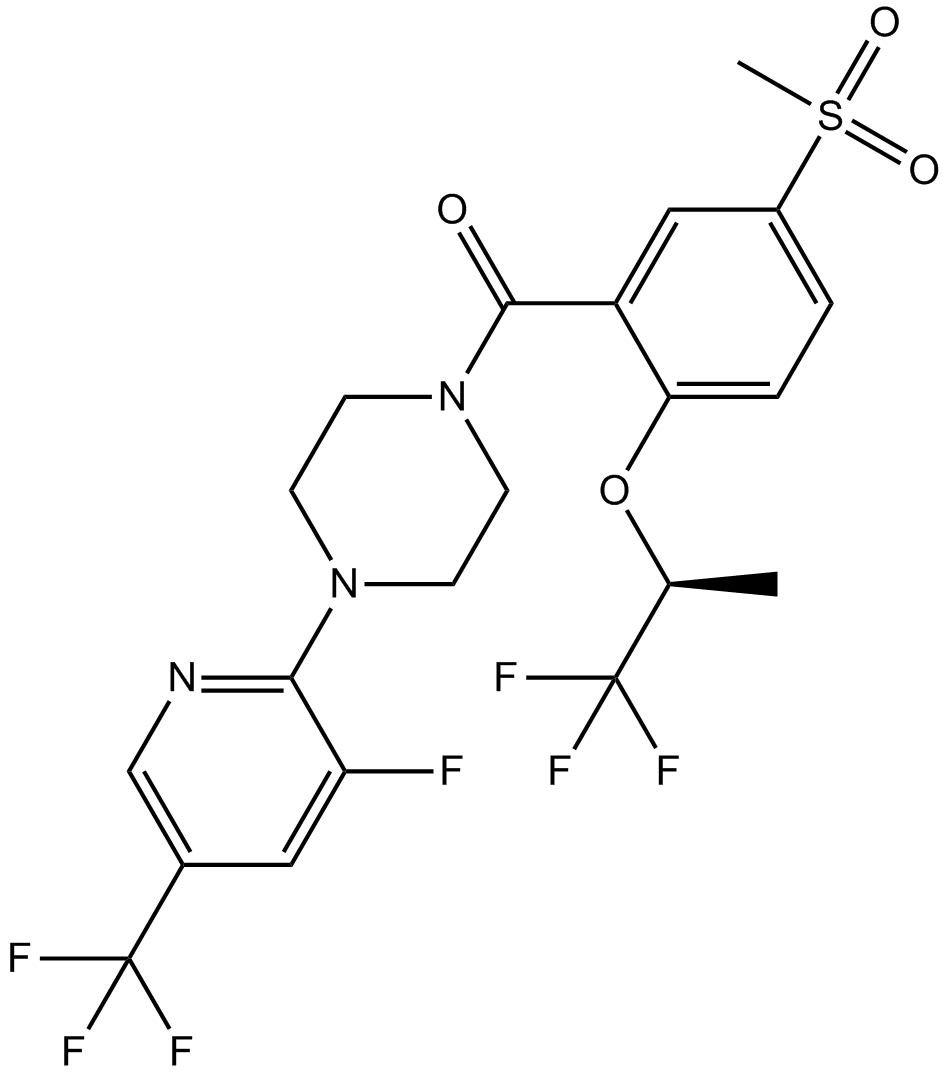Bitopertin (Synonyms: RG-1678, RO-4917838) |
| Catalog No.GC10206 |
An inhibitor of GlyT1
Products are for research use only. Not for human use. We do not sell to patients.

Cas No.: 845614-11-1
Sample solution is provided at 25 µL, 10mM.
Bitopertin, also known as RG1678, is a potent and selective inhibitor of GlyT1 with an EC50 of 30nM. [1]
Abnormal signaling through the N-methyl-D–aspartate (NMDA) receptor has been hypothesized to be a key factor underlying many signs and symptoms of schizophrenia. Increasing NMDA receptor function pharmacologically is thought to compensate for dysfunctional receptor signaling and is a promising approach for the treatment of schizophrenia. Targeting the NMDA receptor allosteric glycine site has been assumed as an approach to enhance NMDA receptor functioning and thus normalize glutamate transmission, which can be achieved by glycine agonists and also by preventing synaptic clearance of glycine through the inhibition of the glycine transporter type 1 (GlyT1). Bitopertin selectively inhibits GlyT1, thus increasing the synaptic level of glycine, an obligatory coagonist at the NMDA receptor, and consequently enhancing NMDA signaling. [1, 2]
Bitopertin was found to possess a high in vitro GlyT1 inhibitory activity with EC50 of 30nM, and a favorable hERG activity with IC50 of 17μM. Moreover, Bitopertin also showed excellent selectivity over GlyT2, as well as a panel of 86 other targets including transmembrane and soluble receptors, enzymes, ion channels, and monoamine transporters. Notwithstanding Bitopertin showed low aqueous solubility, it exhibited a satisfactory solubility characteristics in both fasted state simulated intestinal fluid (20 μg/mL) and fed state simulated intestinal fluid (60 μg/mL). Additionally, by parallel artificial membrane permeation assay it exhibited excellent membrane permeability. [1]
In a phase II RCT study, placebo and different doses of Bitopertin were added to standard antipsychotic treatment for 8 weeks, which revealed that Bitopertin groups had significantly higher response rates and trends towards improved function. Bitopertin inhibiting glycine reuptake is likely to be a new treatment for schizophrenia with negative symptoms. [2]
References:
1.Pinard E, Alanine A, Alberati D, et al. Selective GlyT1 inhibitors: discovery of [4-(3-fluoro-5-trifluoromethylpyridin-2-yl) piperazin-1-yl][5-methanesulfonyl-2-((S)-2, 2, 2-trifluoro-1-methylethoxy) phenyl] methanone (RG1678), a promising novel medicine to treat schizophrenia[J]. Journal of medicinal chemistry, 2010, 53(12): 4603-4614.
2.Umbricht D, Alberati D, Martin-Facklam M, et al. Effect of bitopertin, a glycine reuptake inhibitor, on negative symptoms of schizophrenia: a randomized, double-blind, proof-of-concept study[J]. JAMA psychiatry, 2014.
Average Rating: 5 (Based on Reviews and 30 reference(s) in Google Scholar.)
GLPBIO products are for RESEARCH USE ONLY. Please make sure your review or question is research based.
Required fields are marked with *




















